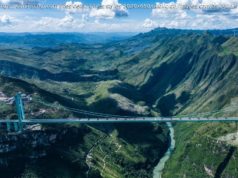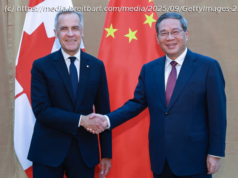Tillerson blasted China for suppressing the truth about the crushing of the protests 28 years ago, and called on the country to stop harassing victims’ relatives who want compensation.
Secretary of State Rex Tillerson has blasted China for suppressing the truth about its crushing of the Tiananmen Square protests 28 years ago.
Tillerson released a statement through the White House in which he called on the country to open up about those who were ‘killed, detained or missing’ when the Chinese army brutally broke up student protests in 1989.
He also demanded that the government stop harassing and imprisoning those who try to talk about the incident, which is suppressed in the country.
Scroll down for video
‘This year marks the 28th anniversary of the Chinese government’s violent suppression of a peaceful protest that took place in and around Tiananmen Square, ‘ Tillerson said in a written statement .
‘We call again on China to make a full accounting of those killed, detained, or missing due to the events of June 4,1989.
‘We urge China to cease harassment of family members seeking redress and to release from prison those who have been jailed for striving to keep the memory of Tiananmen Square alive.
‘The United States views the protection of human rights as a fundamental duty of all countries, and we urge the Chinese government to respect the universal rights and fundamental freedoms of all its citizens.’
Tillerson’s remarks come at an awkward point in Chinese-American relations.
The US is looking to China to be a steadying hand on the shoulder of its uneasy ally, North Korea, in the face of Kim Jong-un’s continued threats of nuclear war.
Donald Trump has assured the American public that China is trying ‘very hard’ to keep the rogue state, with which it shares a border, from causing problems.
At the same time, the US recently took its boldest-ever moves against China to protect international waters in the South China Sea.
China claims ownership of the sea, which is one of the world’s most heavily trafficked international waterways, and says its artificial islands are evidence of that claim.
On May 25, to reaffirm that the waters belong to no-one, the USS Dewey sailed within 12 miles of one of China’s artificial islands and held a military exercise there.
Beijing blasted the US, and buzzed American planes with their jets. Tillerson’s condemnation of China over Tiananmen Square and the subsequent fallout is unlikely to please them either.
The protest itself – most famously symbolized by the ‘Tank Man’ photograph of a student standing in the path of a column of army tanks – was the culmination of months of unrest.
That began on April 15,1989 when prominent Communist least Hu Yaobang, who had pushed for the party to move towards democracy, died.
Afterward, a series of marches began on Tiananmen Square, which lies in the center of the capital, in front of the ancient home of the emperor, the Forbidden City.
Mourning demonstrators, many students, called upon the government to embrace democratic reform, end press censorship and reveal how much government workers are paid, among other demands.
The rallies increased in size, with around 1.2 million people descending on the square on May 19, forcing Zhao Ziyang, general secretary of the Chinese Communist Party, to plead with them to disperse.
That same day martial law was imposed, foreign media was blocked from being screened in the country, and foreign reporters were banned from reporting on the rallies.
But they continued – as did disruptions, uprisings and protests across the country.
On the evening of June 3,11 divisions of the Chinese army, including tanks and armored cars, descended on Tiananmen Square. Civilians attempted to block their arrival, but failed.
From just after midnight on June 4 onwards, the army attacked the civilians, many of whom fought back, while others attempted to reason with soldiers.
Fleeing civilians were shot in their backs in front of journalists, while others were killed when a tank drove into crowds. Others were taken away by police for interrogation.
The Chinese government has never confirmed the number of dead, missing or detained in the incident and today it is not allowed to be discussed in China.
Talk of the protests online is quickly deleted, and images of the protests – especially the Tank Man – are blocked.
The Square itself is usually under heavy police presence every anniversary over concerns about memorials, and families who press for compensation are routinely harassed by authorities.
However, in Hong Kong – which still struggles to maintain independence from the Chinese mainland – a remembrance was held on Sunday.
Thousands gathered around a statue of the Goddess of Democracy in Victoria Park and gave prayers to the lost during a candlelight vigil.






